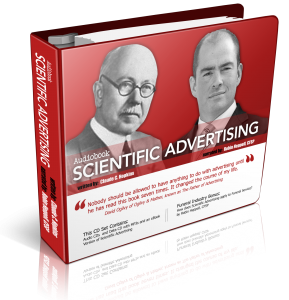

Originally posted: http://www.funeralfuturist.com/scientific-advertising/
 Thank you for your interest in learning more about advertising and marketing for your funeral home or cemetery. I am a life long student and since you have taken the time to listen to this recording I can only imagine that you have the same desire for self improvement and increasing the profit of your business.
Thank you for your interest in learning more about advertising and marketing for your funeral home or cemetery. I am a life long student and since you have taken the time to listen to this recording I can only imagine that you have the same desire for self improvement and increasing the profit of your business.
The Marketing Masters like Hopkins never get studied by those who are looking for the quick fix or the so called silver bullet, but you will realize quite quickly after listening to Hopkins work, that applying his principles is a sure bet, and over time you will continue to increase your odds – or returns with your marketing efforts.
Fly-by-nighters, don’t have the patience – or probably the intelligence – to study the Masters because this is heavy stuff and not for the faint of heart. You cannot skim his book, and almost every line needs to be digested and analyzed.
As David Ogilvy said of it,”Nobody should be allowed to have anything to do with advertising until he has read this book seven times. It changed the course of my life.”
There is a reason he said seven times – because you can’t just read or listen to it once. And this is the reason why I created this audiobook – I thought that after reading it three times and listening to it twice in audio format, if I really want to learn it, I should create my own audio recording. In doing so, I would read each chapter twice – aloud – and then a third time to record it, so I have surpassed Ogilvy’s charge and I am still learning.
The other reason why I wanted you to have this recording is that one of the skills that I have developed, and continue to hone is that I have a knack of identifying principles, strategies and tactics and applying them to funeral service. Basically connecting the dots from real world examples and relating them to funeral homes and cemeteries. As I mentioned before, this type of strategic marketing is not for wimps – and by diving into this book you are definitely not one of them, but I want to let you know that you are not alone and that a lot of these principles – although head-scratching at first – are pure gold when applied to your business.
This book is written based on the results of direct mail and print advertising and since it was written a century ago, it doesn’t talk about radio, tv, yellowpages, the Internet or mobile phones.
Download Scientific Advertising by Claude Hopkins for Free
But don’t let that diminish the validity of this book – Marketing principles are timeless, and Hopkins methodically reveals how these principles were applied to the marketing channels of his time, and it is our job – mine and yours – to take those same principles and apply them to the marketing channels of today.
As a word of warning, not every chapter will seem like a pot of gold for funeral directors – some will – but even in the ones that don’t there are nuggets in there that I will mine for you so that you can apply them in your business. Just sit back, close your eyes – unless you are driving – and prepare your mind for an education in marketing and advertising that originated a century ago but is still relevant today and will be into the future.
Since it was originally written in 1923, some of the terms that uses have slightly different meanings now, – most importantly his use of the term Advertising encompasses more than just advertisements – it is about the bigger picture which we refer to as Marketing today. When he mentions “lines” those are product lines, and “articles” are what we would call products. When he talks about the “advertisers” he is not talking about the advertising agencies but about the companies who are promoting their products. The word “concern” is referring to another company – somewhat like how we may say a “going concern” instead us being concerned or worried about something.
The numbers that are cited in this book seem to be quite a bit less than today’s standards, but here is one number that if you ever questioned Hopkins authority it should be validated by what he was paid. His salary was $185,000 – not converted to today’s value, but that is what he earned per year in 1907.
Also, he talks about himself in the third person – usually as “the writer” as he is providing case studies from his clients first hand. And lastly, in the twenties it must have been an old boys club as he only talks about men – salesmen, businessmen, etc., although even then he knew that the woman of the house made the purchasing decisions – just like today. Just don’t get upset with me since it is my voice saying those words – they are the words of the great, Mr. Claude C. Hopkins.